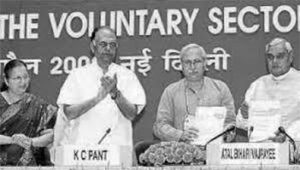 “It is the collective failure of our entire political establishment…(not) to realise that democracy at the grassroots cannot be strengthened without a tradition of public service and the spirit of voluntarism. These organisations promote a culture of cooperation among the people, and between people and the government. They help in strengthening institutions. There is a need to alter the relationship of daata (benefactor) and yaachak (supplicant) between the government and voluntary organisations,” he said. He spoke with such passion and conviction that it created a positive and inclusive ambience in the conference. In a hall full of chief ministers, senior national and state government ministers, hundreds of civil society activists and leaders (including Anna Hazare & late Mohan Dharia), his words signalled a new era in the relations between government and civil society in India.
Speaking at the inaugural session, Ms Nafisa Barot and I had called upon the then Prime Minister to support and enhance the contributions of India’s voluntary sector “through an enabling policy and legal environment at the national and provincial level”. I stressed that a major aspect of this enabling environment is the need for protection of activists and voluntary organisations from official and political harassment.
Atal-ji recognised the immense contributions of the voluntary sector in nation-building. He urged the Planning Commission to evolve a policy to empower voluntary organisations through a special support mechanism to enable them to play their due role in achieving the mission of national development. The then Planning Commission could not complete this task.
When Congress-led UPA government came to power in 2004, the Planning Commission re-started this unfinished agenda under leadership of Smt Sayeda Hameed, an active Member of the Commission. As part of the 11th Plan, a National Policy on Voluntary Sector was notified in July 2007. But the political establishment did not take this policy forward with commitment.
As we remember the myriad contributions of Atal-ji, his commitment to working together with the voluntary sector needs to be recalled as well. His words and actions created a culture of dialogue, mutual respect and cooperation. Alas, we miss that culture today.
How can we take forward that unfinished agenda from Atal-ji’s invocation nearly 20 years ago--of creating a positive enabling culture and system for voluntary organisations to contribute effectively to national development in India?
“It is the collective failure of our entire political establishment…(not) to realise that democracy at the grassroots cannot be strengthened without a tradition of public service and the spirit of voluntarism. These organisations promote a culture of cooperation among the people, and between people and the government. They help in strengthening institutions. There is a need to alter the relationship of daata (benefactor) and yaachak (supplicant) between the government and voluntary organisations,” he said. He spoke with such passion and conviction that it created a positive and inclusive ambience in the conference. In a hall full of chief ministers, senior national and state government ministers, hundreds of civil society activists and leaders (including Anna Hazare & late Mohan Dharia), his words signalled a new era in the relations between government and civil society in India.
Speaking at the inaugural session, Ms Nafisa Barot and I had called upon the then Prime Minister to support and enhance the contributions of India’s voluntary sector “through an enabling policy and legal environment at the national and provincial level”. I stressed that a major aspect of this enabling environment is the need for protection of activists and voluntary organisations from official and political harassment.
Atal-ji recognised the immense contributions of the voluntary sector in nation-building. He urged the Planning Commission to evolve a policy to empower voluntary organisations through a special support mechanism to enable them to play their due role in achieving the mission of national development. The then Planning Commission could not complete this task.
When Congress-led UPA government came to power in 2004, the Planning Commission re-started this unfinished agenda under leadership of Smt Sayeda Hameed, an active Member of the Commission. As part of the 11th Plan, a National Policy on Voluntary Sector was notified in July 2007. But the political establishment did not take this policy forward with commitment.
As we remember the myriad contributions of Atal-ji, his commitment to working together with the voluntary sector needs to be recalled as well. His words and actions created a culture of dialogue, mutual respect and cooperation. Alas, we miss that culture today.
How can we take forward that unfinished agenda from Atal-ji’s invocation nearly 20 years ago--of creating a positive enabling culture and system for voluntary organisations to contribute effectively to national development in India?
PRIA’s MobiliseHER team traveled to Bangalore during the week of June, 10 – 14, 2024. The aim of the visit was to gain relevant insights into the civil society ecosystem in Bangalore and meet different organisations to understand the city through a lens of gender and inclusive mobility.
Working at PRIA, often leads us to various cities across the country. Each trip is an opportunity to witness firsthand the challenges and triumphs of different communities.
Mr. Yedukrishnan V has recently joined PRIA after gaining valuable experience in the development sector. Drawing from his journey in the social sector and personal encounters in Kerala, he emphasises the importance of participatory governance and research in empowering marginalised communities.'